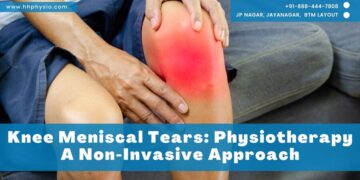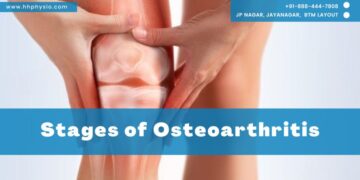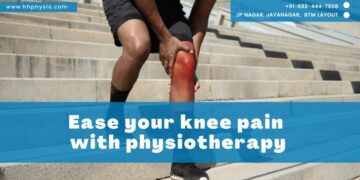Knee Pain

Knee Pain Causes and Symptoms
Knee pain is a common complaint that can affect people of all ages and lifestyles. Whether you're an athlete, a desk worker, or an active senior, understanding knee pain, its causes, symptoms, and treatment options is crucial for maintaining a healthy and active lifestyle. Knee pain can result from various factors like Injuries, medical condition, obesity, poor mechanics etc. Injuries like torn ligament and medical condition like arthritis and gout can cause knee pain.
Some minor knee pain can be treated with some self care measures. Physiotherapy can help you in treating your knee pain from the core. However, in few cases you have to go through surgical process and in severe cases knees are replaced. So, Visit Healing Hands Advanced Physiotherapy Clinic and get rid your knee pain before its too late.
Knee Pain Symptoms
The intensity and area of pain in the left or right knee can vary, depending on the cause of problem. Some of the symptoms of Knee Pain are:
- Swelling and Stiffness
- Redness and warmth to the touch
- Unable to straighten your knees
- Instability or weakness
- Popping or clicking sensations
- Difficulty bearing weight or walking
Causes of Knee Pain
Multiple causes of knee pain can cause you severe pain, if not taken seriously. Some knee pain causes are:
- Injury: Trauma from falls, sports injuries, or accidents can damage structures within the knee, such as ligaments, tendons, or cartilage.
- Overuse: Repetitive movements or activities, especially those involving running, jumping, or kneeling, can strain the knee joint and lead to pain.
- Arthritis: Various forms of arthritis, including osteoarthritis, rheumatoid arthritis, and gout, can cause inflammation and degeneration of the knee joint.
- Obesity: Excess weight puts added stress on the knees, increasing the risk of pain and joint damage.
- Poor biomechanics: Issues with alignment, muscle imbalances, or improper footwear can contribute to knee pain over time.
Arthritis
Arthritis Affecting the Knees:
Arthritis affecting the knees can significantly impact an individual's quality of life. Osteoarthritis, the most common form of arthritis, typically develops gradually over time, with symptoms worsening as the condition progresses. As the cartilage within the knee joint wears away, bones may rub against each other, causing pain, swelling, and stiffness. Activities such as walking, climbing stairs, or even standing for extended periods can exacerbate symptoms.
Rheumatoid arthritis, another form of arthritis that affects the knees, is characterized by inflammation of the synovium, the lining of the joint. This inflammation can lead to pain, swelling, and joint deformity, often affecting both knees simultaneously. Unlike osteoarthritis, which primarily results from wear and tear, rheumatoid arthritis is an autoimmune disorder in which the body's immune system mistakenly attacks its tissues, including the joints.
Managing arthritis-related knee pain typically involves a combination of medication, physical therapy, lifestyle modifications, and in some cases, surgical intervention. While there is no cure for arthritis, various treatment options can help alleviate symptoms, improve joint function, and enhance quality of life.
It's essential for individuals with knee arthritis to work closely with Physiotherapist and healthcare professionals to develop a comprehensive treatment plan tailored to their specific needs and goals
When to consult a Physiotherapist:
While mild knee pain may resolve with rest and self-care measures, it's essential to consult a physiotherapist if you experience:
- Persistent or worsening pain despite conservative treatments.
- Swelling, redness, or warmth around the knee joint.
- Difficulty bearing weight or walking.
- Instability or locking of the knee joint.
- Recurrent episodes of knee pain or injury.
How to prevent Knee Pain
There are many things which you should consider to prevent knee pain. Exercises for knee pain is the best solution but you need to consult your physiotherapist first. Some of the few things to prevent knee pain are:
- Maintain a healthy weight to reduce strain on the knees.
- Warm up before exercising and cool down afterward to prevent injury.
- Use proper techniques and equipment when engaging in physical activities.
- Strengthen the muscles around the knee through targeted exercises.
- Wear supportive footwear and avoid high heels or shoes with inadequate cushioning.
- Listen to your body and avoid overexertion.
Physiotherapy Treatments for Knee Pain
Physiotherapy offers a holistic approach to managing Knee pain, focusing on pain relief, restoring mobility, and preventing future recurrences. Physiotherapy for knee pain relief offers a range of effective interventions to address pain, improve function, and enhance overall quality of life. Through a combination of manual therapy, targeted exercises, modalities, and biomechanical assessments, physiotherapists strive to restore optimal joint mechanics, strengthen surrounding muscles, and alleviate discomfort.
Manual therapy techniques, such as joint mobilization and soft tissue massage, work to reduce stiffness and improve range of motion. Personalized exercise programs focus on strengthening weakened muscles, improving flexibility, and improve the overall health of the knee joint. Modalities like ultrasound and electrical stimulation provide additional pain relief and promote tissue healing. Moreover, education and self-management strategies empower individuals to take an active role in their recovery, facilitating long-term success. With a comprehensive physiotherapy approach, individuals can effectively manage knee pain, regain function, and return to their desired level of activity.
Related Blogs .
Physiotherapy: A Non-Invasive Approach for Healing Knee Meniscal Tears
In recent years, there has been a growing understanding that not all knee meniscal tears require surgery. In fact, physiotherapy...
Read PostStages Of Osteoarthritis & How Physiotherapy Helps In Osteoarthritis
Osteoarthritis (OA) is a degenerative joint disease that affects millions of people worldwide. It is characterized by...
Read PostEase your knee pain with physiotherapy
Physiotherapy, also known as physical therapy, can be very effective for knee pain. The knee is a complex joint that...
Read Post


